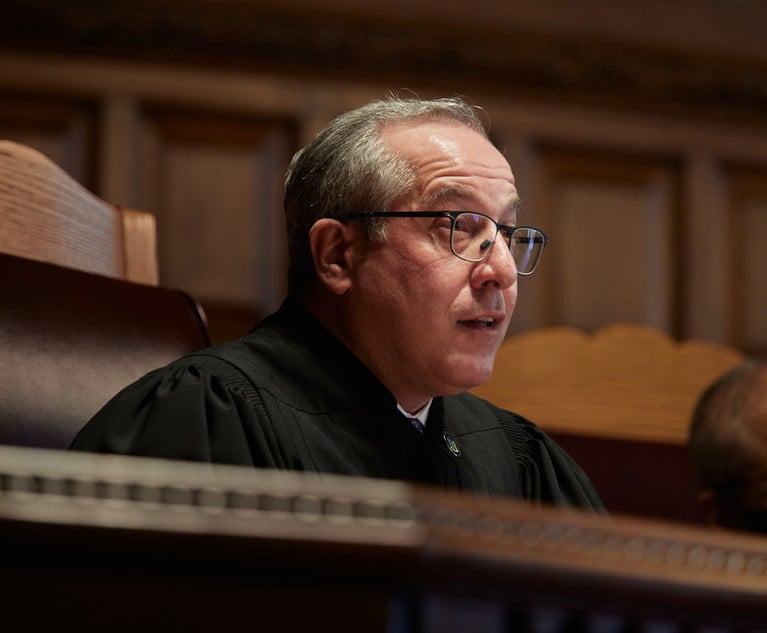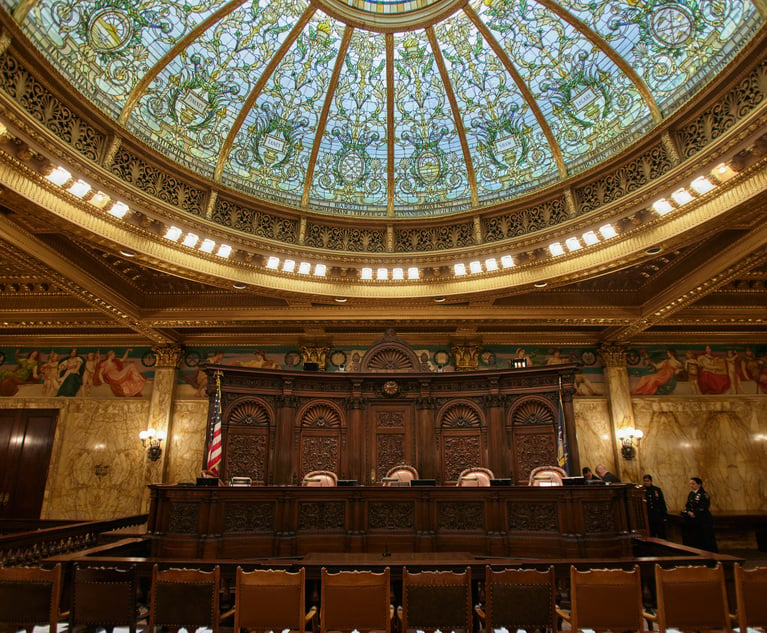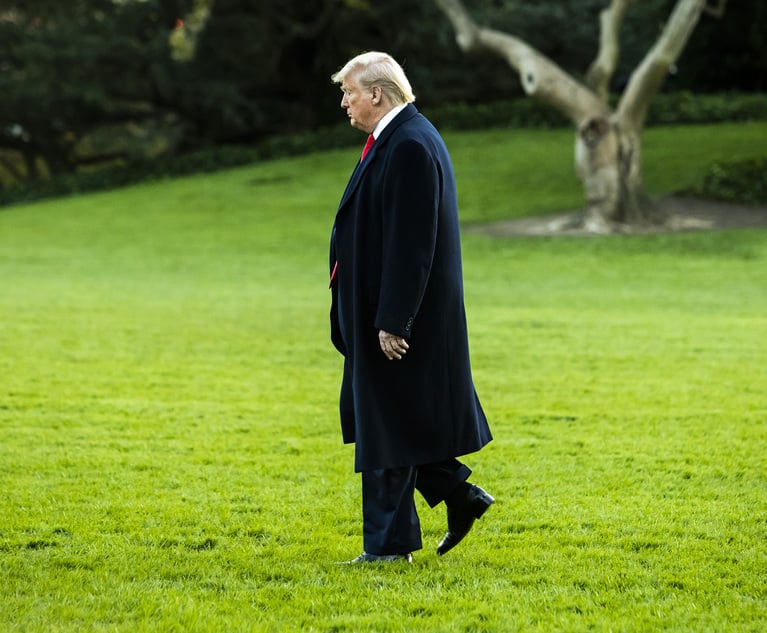Do Swing Votes on NY's Highest Court Raise Hopes for Consensus Decisions?
In two cases the acting chief judge and the latest addition to the court voted with the majority, once for a criminal defendant and once for the prosecution.
March 20, 2023 at 11:49 AM
4 minute read
 Acting Chief Judge Anthony Cannataro. Photo: Ryland West
Acting Chief Judge Anthony Cannataro. Photo: Ryland West As New York's highest court continues to operate without a seventh jurist, the fear of 3-3 deadlocks may be easing, if two criminal decisions are a leading indicator.
In both cases the acting chief judge and the latest addition to the court voted with the majority, once for a criminal defendant and once for the prosecution.
It's not a lot of data points, but the cases handed down on March 16 may be a departure from some of the high court's reputation as decidedly in favor of prosecutors. And while it may be temporary, the high court achieved consensus for decisions on opposite sides of the prosecution-defense aisle.
It has court watchers hopeful that consensus is possible for the state's highest court, which was split evenly between liberal progressives and moderate conservatives.
The judges handed down a pair of 4-2 decisions in criminal cases—one in favor of the defense regarding a speedy trial matter in a rape case written by Judge Rowan Wilson captioned People v. Andrew Regan.
The other, a memorandum decision in People v. Santino Guerra, was a win for prosecutors, in a case over evidence of a crime victim's prior violent acts.
In both cases, Acting Chief Judge Anthony Cannataro and Associate Justice Shirley Troutman were swing votes.
These developments are worth watching during the state's ongoing search for a chief judge.
Although Duane Morris attorney Thomas R. Newman hadn't yet read either of the two Thursday cases, the author of New York Appellate Practice had already observed that criminal defendants-appellants "have rarely, if ever, found a more receptive court for their pleas" than under Cannataro's leadership since he became acting chief judge on Sept. 1, 2022.
From October 2022 to February 2023, Newman said the court decided 13 criminal appeals, resulting in four affirmances and nine reversals.
In an interview with the Law Journal on Friday, Newman said: "I don't like applying any sort of political labels to the court. I like to think that the judges will decide each case that comes before them based on the facts and the law as they find it—and if it comes down for the defendant, okay; and if it comes down for the prosecution, so be it."
Newman addressed how some Democratic lawmakers and progressive groups have said the court doesn't need another former prosecutor, since it already has two.
"Some of the best judges on the court and in the country were former prosecutors," Newman said, mentioning the late Stanley Fuld and the late Charles Breitel.
"I just have been not happy with people wanting to try to categorize the judges as conservative or liberal and that's how they should decide their cases," Newman said. "It's beginning to look and sound too much like people speaking about the Supreme Court of the United States and how they're viewed, the political bent of the justices. I like to think the New York Court of Appeals has always just decided cases on the facts and the law, end of story."
But Albany Law School professor Vincent Bonventre said he views the court as "still fairly pro-prosecution," but added that he saw "a glimmer of hope" with the court's Regan decision.
Bonventre said Cannataro has always been in the majority of the decisions involving criminal cases, while Judge Michael Garcia has always been for the prosecution, and Wilson always for the defense. Judge Jenny Rivera was with the defendant most but not all the time, said Bonventre, who authors the New York Court Watcher blog.
"You would hope that in these these close cases, the judges wouldn't always be voting the same way," Bonventre said. "But there's a footnote to that. If you have a court that is lopsidedly pro-prosecution, you might expect one or two judges to be in the dissent either all the time or almost all the time because the court is so far in that direction. And then vice versa: if you have a court that's so pro accused, you might imagine that there would be a judge or two that is either always very frequently disagreeing."
Bonventre pointed out that during the last months of former Chief Judge Janet DiFiore's tenure, all nine criminal decisions were in favor of the prosecution, of which seven were divided, unsigned opinions.
"Usually the company line in unsigned opinions is that there isn't much of an issue, all we're doing is applying settled law," Bonventre said.
This content has been archived. It is available through our partners, LexisNexis® and Bloomberg Law.
To view this content, please continue to their sites.
Not a Lexis Subscriber?
Subscribe Now
Not a Bloomberg Law Subscriber?
Subscribe Now
NOT FOR REPRINT
© 2025 ALM Global, LLC, All Rights Reserved. Request academic re-use from www.copyright.com. All other uses, submit a request to [email protected]. For more information visit Asset & Logo Licensing.
You Might Like
View All
Decision of the Day: Trial Court's Sidestep of 'Batson' Deprived Defendant of Challenge to Jury Discrimination

President Trump Hires Sullivan & Cromwell to Handle Manhattan Criminal Appeal


Law Firms Mentioned
Trending Stories
- 1Uber Files RICO Suit Against Plaintiff-Side Firms Alleging Fraudulent Injury Claims
- 2The Law Firm Disrupted: Scrutinizing the Elephant More Than the Mouse
- 3Inherent Diminished Value Damages Unavailable to 3rd-Party Claimants, Court Says
- 4Pa. Defense Firm Sued by Client Over Ex-Eagles Player's $43.5M Med Mal Win
- 5Losses Mount at Morris Manning, but Departing Ex-Chair Stays Bullish About His Old Firm's Future
Who Got The Work
J. Brugh Lower of Gibbons has entered an appearance for industrial equipment supplier Devco Corporation in a pending trademark infringement lawsuit. The suit, accusing the defendant of selling knock-off Graco products, was filed Dec. 18 in New Jersey District Court by Rivkin Radler on behalf of Graco Inc. and Graco Minnesota. The case, assigned to U.S. District Judge Zahid N. Quraishi, is 3:24-cv-11294, Graco Inc. et al v. Devco Corporation.
Who Got The Work
Rebecca Maller-Stein and Kent A. Yalowitz of Arnold & Porter Kaye Scholer have entered their appearances for Hanaco Venture Capital and its executives, Lior Prosor and David Frankel, in a pending securities lawsuit. The action, filed on Dec. 24 in New York Southern District Court by Zell, Aron & Co. on behalf of Goldeneye Advisors, accuses the defendants of negligently and fraudulently managing the plaintiff's $1 million investment. The case, assigned to U.S. District Judge Vernon S. Broderick, is 1:24-cv-09918, Goldeneye Advisors, LLC v. Hanaco Venture Capital, Ltd. et al.
Who Got The Work
Attorneys from A&O Shearman has stepped in as defense counsel for Toronto-Dominion Bank and other defendants in a pending securities class action. The suit, filed Dec. 11 in New York Southern District Court by Bleichmar Fonti & Auld, accuses the defendants of concealing the bank's 'pervasive' deficiencies in regards to its compliance with the Bank Secrecy Act and the quality of its anti-money laundering controls. The case, assigned to U.S. District Judge Arun Subramanian, is 1:24-cv-09445, Gonzalez v. The Toronto-Dominion Bank et al.
Who Got The Work
Crown Castle International, a Pennsylvania company providing shared communications infrastructure, has turned to Luke D. Wolf of Gordon Rees Scully Mansukhani to fend off a pending breach-of-contract lawsuit. The court action, filed Nov. 25 in Michigan Eastern District Court by Hooper Hathaway PC on behalf of The Town Residences LLC, accuses Crown Castle of failing to transfer approximately $30,000 in utility payments from T-Mobile in breach of a roof-top lease and assignment agreement. The case, assigned to U.S. District Judge Susan K. Declercq, is 2:24-cv-13131, The Town Residences LLC v. T-Mobile US, Inc. et al.
Who Got The Work
Wilfred P. Coronato and Daniel M. Schwartz of McCarter & English have stepped in as defense counsel to Electrolux Home Products Inc. in a pending product liability lawsuit. The court action, filed Nov. 26 in New York Eastern District Court by Poulos Lopiccolo PC and Nagel Rice LLP on behalf of David Stern, alleges that the defendant's refrigerators’ drawers and shelving repeatedly break and fall apart within months after purchase. The case, assigned to U.S. District Judge Joan M. Azrack, is 2:24-cv-08204, Stern v. Electrolux Home Products, Inc.
Featured Firms
Law Offices of Gary Martin Hays & Associates, P.C.
(470) 294-1674
Law Offices of Mark E. Salomone
(857) 444-6468
Smith & Hassler
(713) 739-1250






